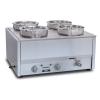Dietary Requirements, Food Allergy and Intolerance - Complete Guide for Restaurants
Dietary Requirements
1. The perfect runner's diet
A food pyramid is a great way to visualize how much you should be eating of the essential food groups. The latest research from the United States suggests that the AU/UK's dietary guidelines set in 1991 need updating. Based on the latest science, here is a rough idea of what your healthy daily diet should include.
Fruit and vegetables
The Australian & UK governments recommended daily intake of five portions of fruit and vegetables is not enough for runners. Try to eat two 8og (3oz) portions of fruit and three 10g (4oz) portions of vegetables every day. This may seem similar to the AU/UK guidelines but the portions are larger. You can make everyone feel welcome at your table by creating a menu that reflects and respects these requirements.
Which vegetables?
You should include vegetables from each of the following five groups in your diet every week:
o Dark green vegetables, such as broccoli, spinach, and watercress - three portions a week.
o Orange vegetables, such as carrots, butternut squash, sweet potatoes - two portions a week.
o Three portions a week - Lentils, chickpeas, beans.
o Starchy vegetables, like potatoes - 3 portions a week.
o Other vegetables, like tomatoes, cucumber, and cauliflower - six portions a week.
See our vegetable slicers.
Lots of colors
By eating a colorful variety of fruit and vegetables, you will be able to enjoy a healthy selection of vitamins and minerals in your diet. Broccoli and bananas, for example, provide the potassium that is essential to balance the fluid levels in your body, while sweet potatoes are packed with vitamin A to maintain healthy digestion.
Dairy
The calcium in dairy foods ensures that we have healthy bones, while the high protein content helps to repair tissue damage after a run. Aim to eat three portions of low-fat or fat-free dairy products every day. A-portion could be a 300ml serving of skimmed milk, two small pots of yogurt, or 40g cheese. Vegans can choose calcium-fortified fruit juices or soya milk. Foods containing probiotics, such as yogurts and fermented dairy products, promise to improve wellbeing by boosting healthy bacteria in your gut. -They have -also been shown to shorten a cold by as much as two days.
Fat
You should get roughly 25 percent of your daily calories from fat, but keep your intake of saturated fat to less than 10 percent, and avoid animal fats altogether. Aim to include six teaspoons of oil in a 2,000kcal diet. Half an avocado or 25 nuts counts as three teaspoons. Always read the label, and avoid processed foods that include the word 'hydrogenated' in the ingredients list.
Grains
Grains can be divided into two subgroups: whole and refined. Half of the grains you take should be whole grains. For a 2,000kcal diet, aim to eat six portions daily. One slice of bread, one small bowl of cereal and 255 of (dry) pasta, rice or oats all count as one portion. The unrefined versions of bread, rice, pasta, and porridge will provide you with slow-release energy, and the high-fiber content will keep you feeling full and satisfied for longer, making a guilty grab for a chocolate bar far less likely.
Meat and beans
The foods in this group are a great source of protein but they can be high in fat, so limit your intake to about 10g (5oz) daily as part of a 2,000kcal diet. One portion is equivalent to 25g lean meat, poultry or fish, one tablespoon of peanut butter, one egg, lentils or two tablespoons cooked beans.
Treats
Since it's an American invention, the food pyramid even takes into account your need for a treat every now and then. If your daily diet includes 2,000kcals, roughly 250 of these are discretionary, meaning you can use them how you like. For instance, you might want to eat more of one of the above groups or treat yourself to a bar of chocolate. A 300MI glass of beer is 200kcals, a glass of wine is about 100kcals whereas a Mars Bar is 230kcals. Don't use running as an excuse to indulge any more than this.
What’s The Difference between Food Allergies and Intolerances?
What’s the difference between food allergies and intolerances? They are all food related health complications which confuse many people. They both cause someone to feel ill upon eating certain types of food. There is a clear difference between the two health complications. Some of the differences include the following:
Food allergies lead to life threatening reactions but food intolerance does not
Those who suffer from allergic reaction are exposed to anaphylaxis which is a life threatening condition. Food intolerance such as celiac disease and lactose intolerance will make you feel ill but they will not lead to life threatening complications.
Food intolerance in most cases lead to digestion problems while allergic reactions are associated with immune system reaction
When one is suffering from food intolerance, the effects are felt on the stomach. It is a different case from food intolerance which in most cases leads to stomach upsets which can be easily treated. Those who suffer from food intolerance can eat small amounts of food which they experience intolerance and they will be still okay. It is unlike allergic reaction which can be severe even after eating small amounts of food. Allergic reaction leads to affecting several organs in the body.
What causes food allergic reaction?
Food allergic reactions are caused when the immune system interprets the food particles as if they are harmful to the body after which the body overreacts in fighting the food particles. The reaction leads to production of histamine which causes allergy symptoms. Some of the symptoms which can be caused due to production of histamine include sneezing, inflammation, coughing among others. Some reactions are life threatening. It is advisable to seek medical attention immediately you have been affected by allergic reaction. The situation can become worse if not attend to fast. The reaction can lead to organ failure which in most cases can lead to life threatening cases. There are several medications which can be applied by the doctors to help in treating the health complication.
What causes food intolerance?
There are several causes of food intolerance. Common cause includes the following:
Absence of digestive enzymes
There are some enzymes required in the body to digest certain types of food. For example, there is an enzyme required to digest lactose. If the enzyme will miss in the body, it will lead to lactose intolerance. Due to lack of the enzymes, the patients tend to suffer from different digestive problems. The situation can be avoided through eating less amounts of the food or even avoiding the food at all costs. Some people have low amounts of certain enzymes in their digestive systems which lead to poor digestion. The end result is the problem of poor digestion. It can be managed through eating foods which does not require such enzymes for digestion to take place.
Irritable bowel syndrome
It is a condition which can lead to cramping, diarrhea and constipation. If you experience the condition, then you suffer from food intolerance. Irritable bowel syndrome is not a life threatening condition hence it can be easily treated through administering of drugs aimed at treating the condition.
Sensitivity to food additives
There are some ingredients which are used to preserve food and your body is sensitive to such ingredients. For example, ingredients used to preserve dried fruits cause food intolerance to most people. There are also cases where wine and canned foods trigger the food intolerance in people.
Recurring stress and psychological factors
There are incidences where people think about food and they become sick. It is a psychological factor which has not been fully understood. The way your body and mind associates the food makes the feeling of food intolerance come up. Different functions in the body are controlled by the brain. The way the mind perceives certain foods can land you in food intolerance cases.
Celiac disease
It is a condition triggered due to eating gluten rich foods. The problem is more of an allergic reaction but it does not fully qualify to be categorized under allergic reaction because the effects are not life threatening and it only affects the digestive system like most food intolerance cases. Many people who suffer from gluten intolerance avoid eating foods rich in gluten which avoid them the reaction.









